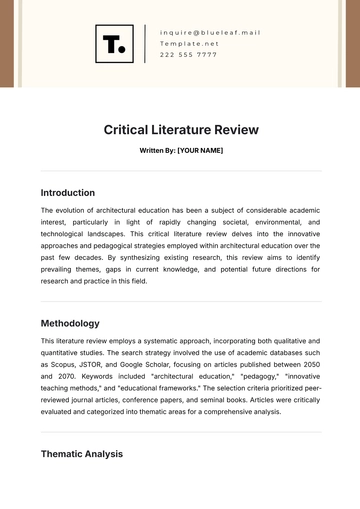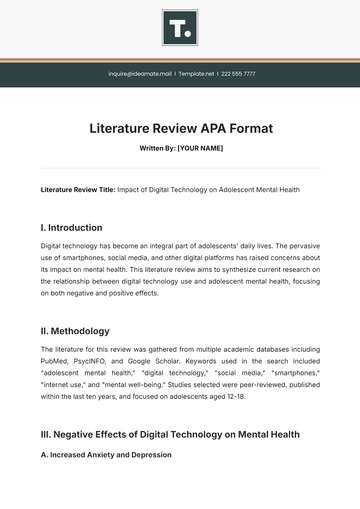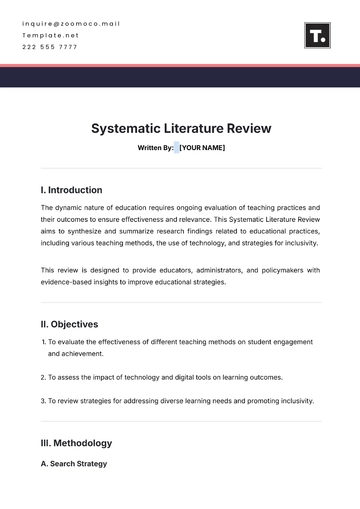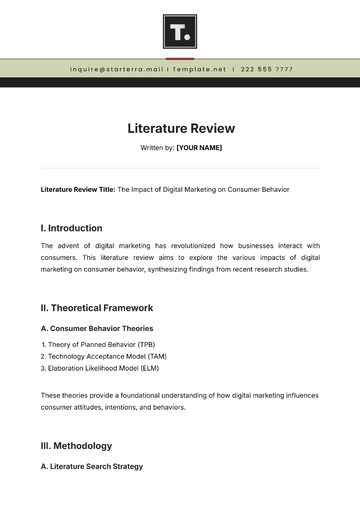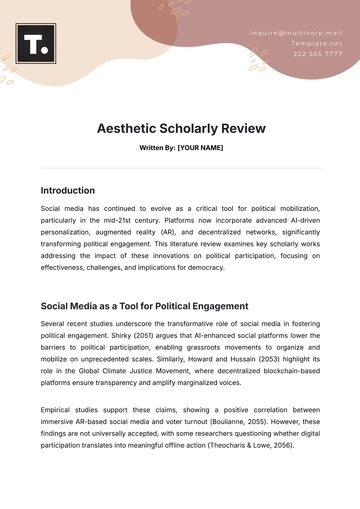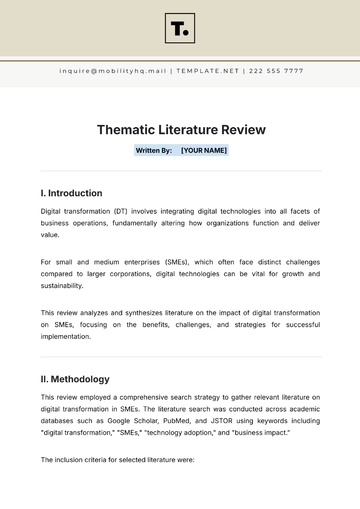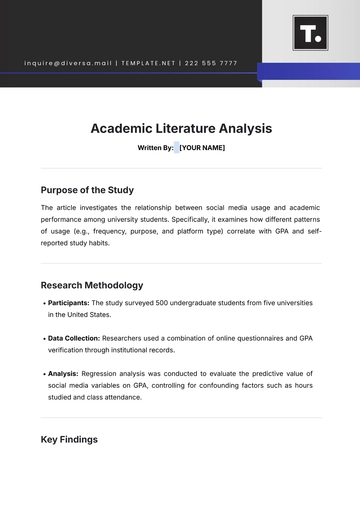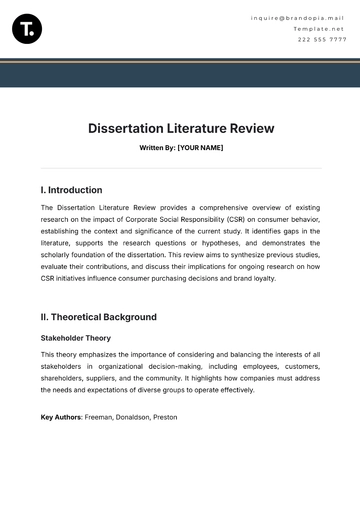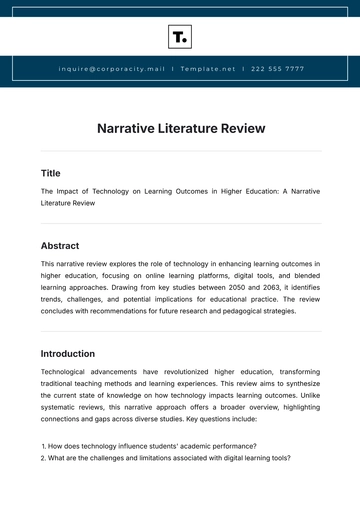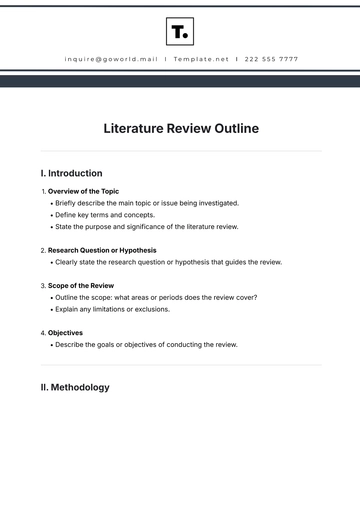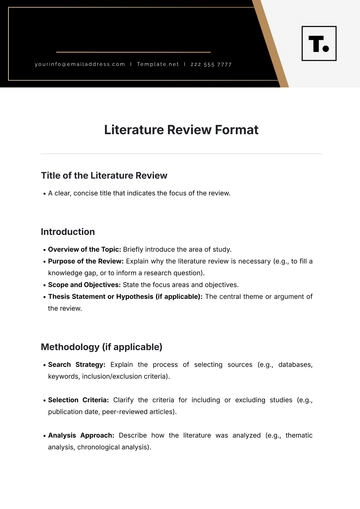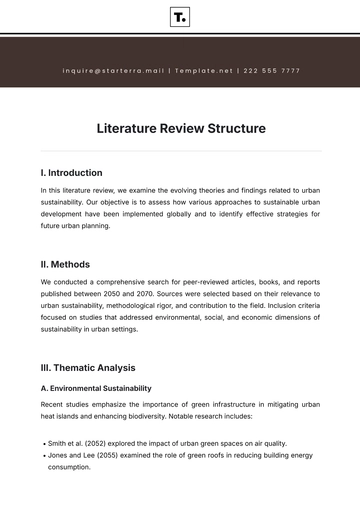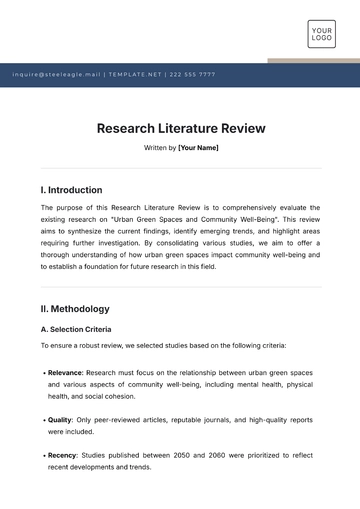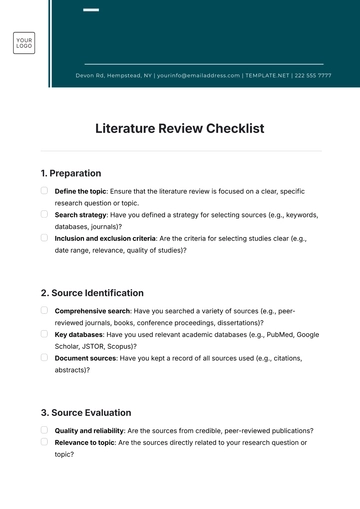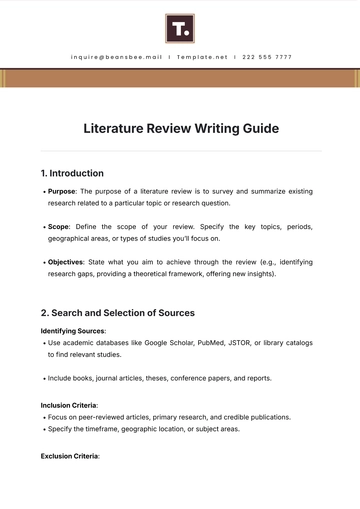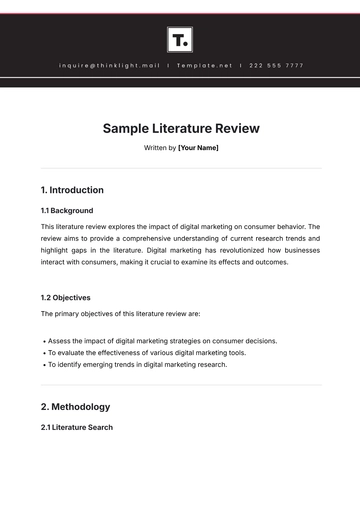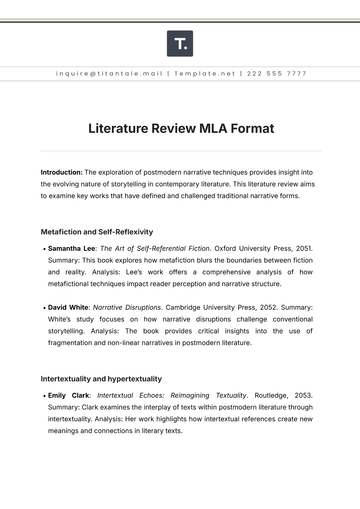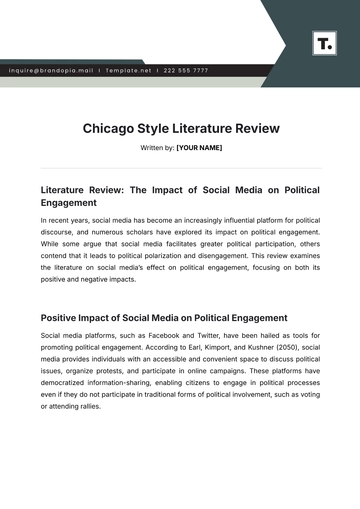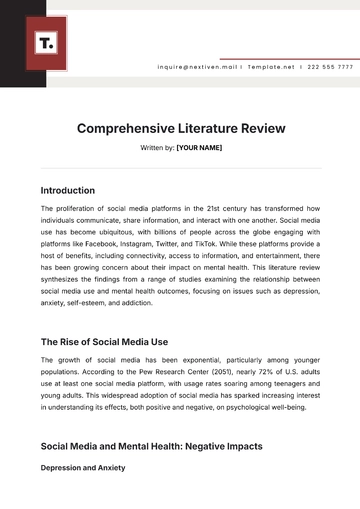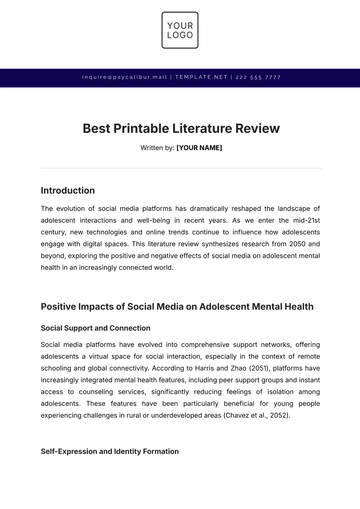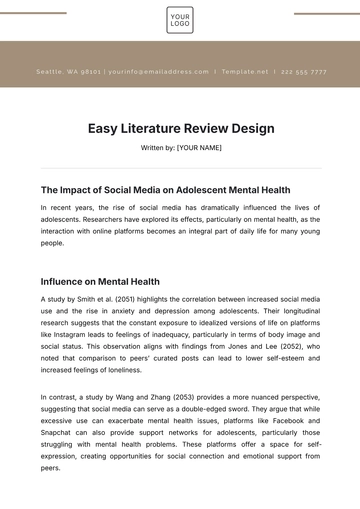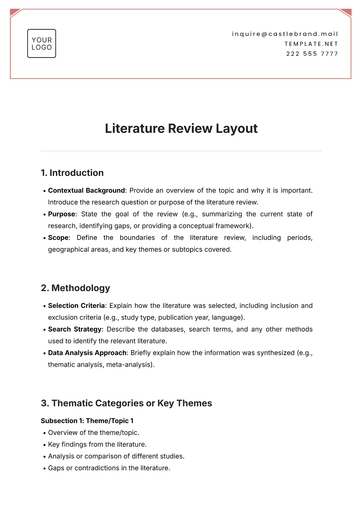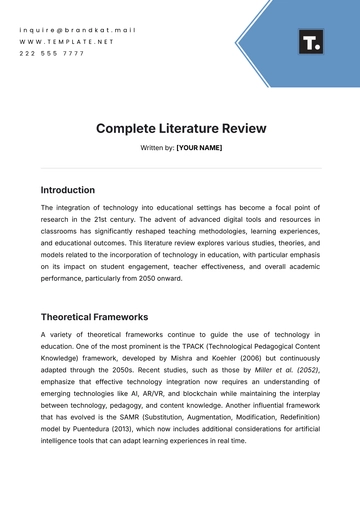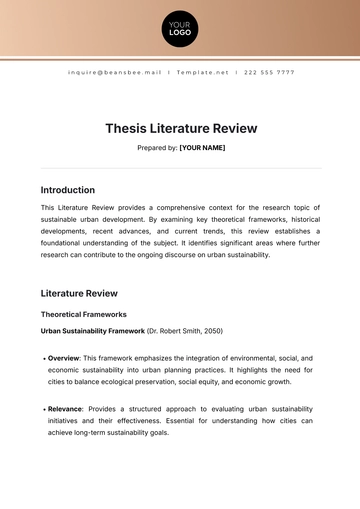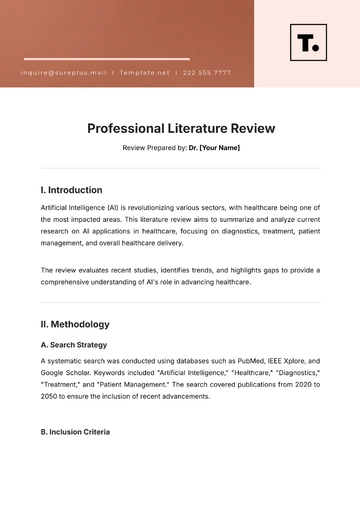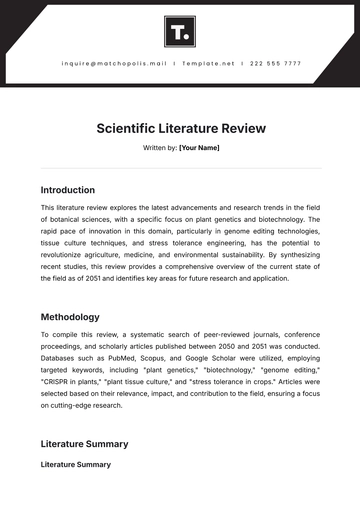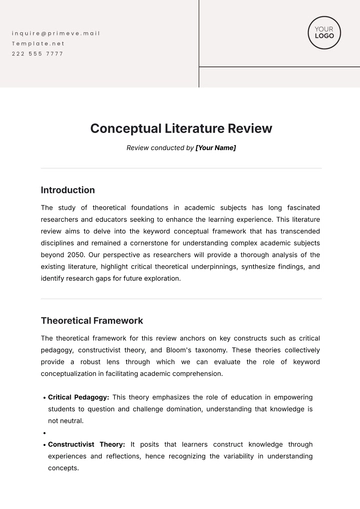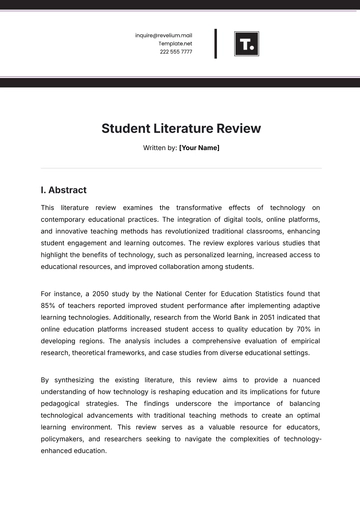Free Literature Review APA Format
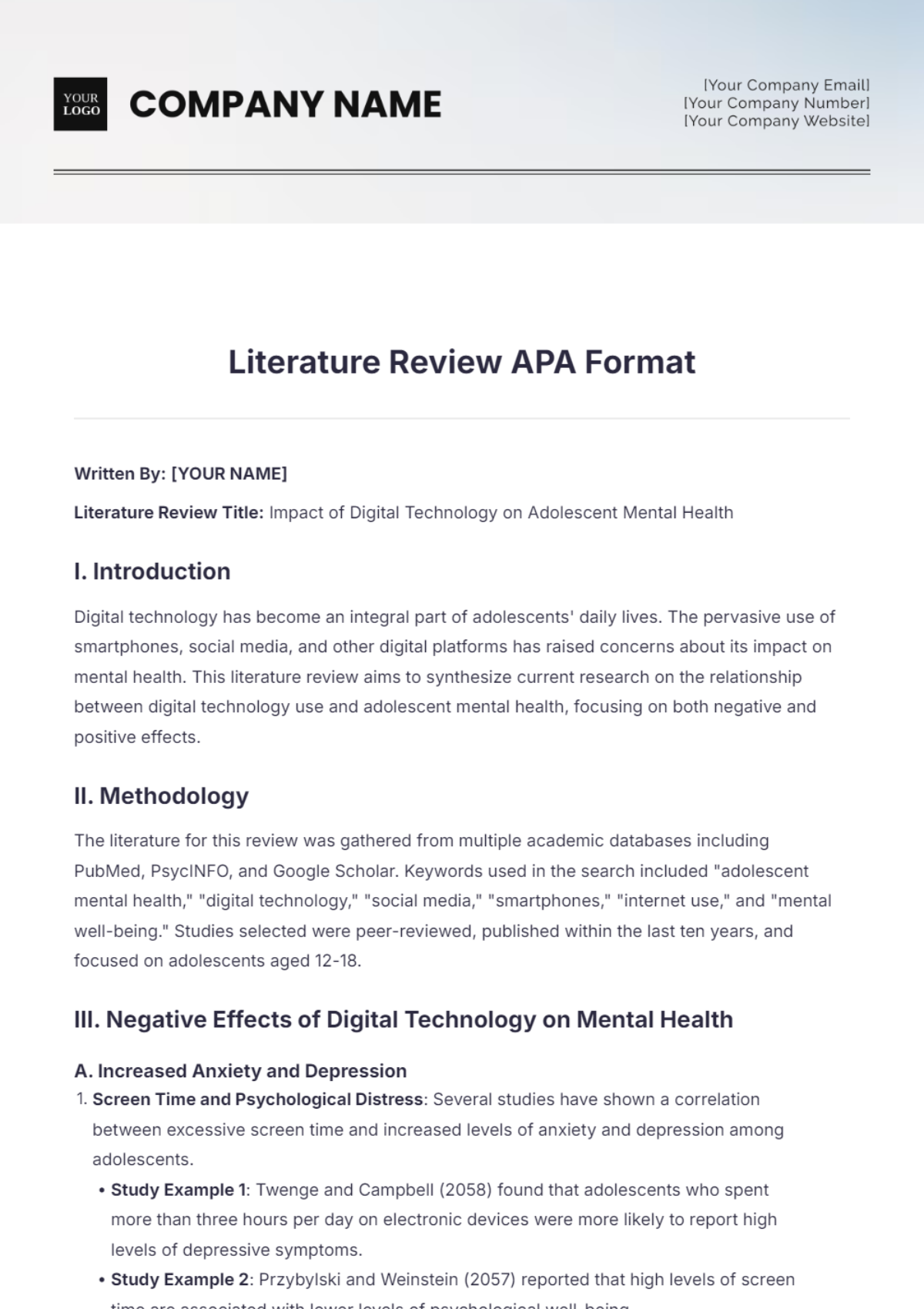
Written By: [YOUR NAME]
Literature Review Title: Impact of Digital Technology on Adolescent Mental Health
I. Introduction
Digital technology has become an integral part of adolescents' daily lives. The pervasive use of smartphones, social media, and other digital platforms has raised concerns about its impact on mental health. This literature review aims to synthesize current research on the relationship between digital technology use and adolescent mental health, focusing on both negative and positive effects.
II. Methodology
The literature for this review was gathered from multiple academic databases including PubMed, PsycINFO, and Google Scholar. Keywords used in the search included "adolescent mental health," "digital technology," "social media," "smartphones," "internet use," and "mental well-being." Studies selected were peer-reviewed, published within the last ten years, and focused on adolescents aged 12-18.
III. Negative Effects of Digital Technology on Mental Health
A. Increased Anxiety and Depression
Screen Time and Psychological Distress: Several studies have shown a correlation between excessive screen time and increased levels of anxiety and depression among adolescents.
Study Example 1: Twenge and Campbell (2058) found that adolescents who spent more than three hours per day on electronic devices were more likely to report high levels of depressive symptoms.
Study Example 2: Przybylski and Weinstein (2057) reported that high levels of screen time are associated with lower levels of psychological well-being.
Cyberbullying: The anonymity and pervasive nature of online interactions have given rise to cyberbullying, which significantly impacts adolescent mental health.
Study Example 1: A meta-analysis by Kowalski et al. (2054) indicated that victims of cyberbullying exhibit higher rates of anxiety, depression, and suicidal ideation.
Study Example 2: Hinduja and Patchin (2059) highlighted the severe psychological impact of cyberbullying, emphasizing the need for preventive measures.
B. Sleep Disruption
Impact on Sleep Patterns: Excessive use of digital devices, especially before bedtime, has been linked to sleep disturbances, which in turn affect mental health.
Study Example 1: A study by LeBourgeois et al. (2057) found that adolescents with higher screen time had shorter sleep duration and poorer sleep quality.
Study Example 2: Gradisar et al. (2053) noted that the blue light emitted from screens can suppress melatonin production, leading to delayed sleep onset.
IV. Positive Effects of Digital Technology on Mental Health
A. Social Connection and Support
Enhanced Communication: Digital technology facilitates communication and social interaction, which can provide emotional support and strengthen relationships.
Study Example 1: A study by Best, Manktelow, and Taylor (2054) suggested that social media can help adolescents maintain connections and receive support from peers.
Study Example 2: Valkenburg and Peter (2051) found that online communication can enhance the quality of existing friendships and contribute to adolescents' social well-being.
Mental Health Resources: Access to online mental health resources and support groups can provide adolescents with valuable information and coping strategies.
Study Example 1: Pretorius et al. (2059) highlighted the benefits of online mental health interventions, noting improvements in anxiety and depression symptoms among adolescents.
Study Example 2: A study by Rickwood et al. (2056) emphasized the role of digital platforms in increasing access to mental health services and reducing barriers to seeking help.
B. Educational and Cognitive Benefits
Learning Opportunities: Digital technology offers a range of educational tools and resources that can enhance cognitive development and academic performance.
Study Example 1: Jackson et al. (2056) found that educational apps and online resources can improve adolescents' academic skills and motivation to learn.
Study Example 2: A study by Subrahmanyam and Greenfield (2058) indicated that certain types of video games can enhance problem-solving skills and cognitive flexibility.
Information Access: The internet provides adolescents with easy access to information on various topics, promoting self-directed learning and intellectual curiosity.
Study Example 1: Buckingham (2053) noted that digital literacy skills are essential for adolescents to navigate and critically evaluate online information.
Study Example 2: A study by Livingstone (2052) highlighted the importance of teaching digital literacy to help adolescents make informed decisions and protect their well-being online.
V. Conclusion
The impact of digital technology on adolescent mental health is multifaceted, with both positive and negative aspects. While excessive screen time and cyberbullying pose significant risks, digital platforms also offer opportunities for social support, education, and access to mental health resources. Future research should focus on identifying strategies to mitigate the negative effects while maximizing the benefits of digital technology for adolescents' mental health.
VI. References
Best, P., Manktelow, R., & Taylor, B. (2054). Online communication, social media and adolescent well-being: A systematic narrative review. Children and Youth Services Review, 41, 27-36.
Buckingham, D. (2053). The impact of the internet on children's daily lives: Physical, emotional, social and psychological wellbeing. The International Encyclopedia of Media Studies.
Gradisar, M., Wolfson, A. R., Harvey, A. G., Hale, L., Rosenberg, R., & Czeisler, C. A. (2053). The sleep and technology use of Americans: Findings from the National Sleep Foundation's 2051 Sleep in America poll. Journal of Clinical Sleep Medicine, 9(12), 1291-1299.
Hinduja, S., & Patchin, J. W. (2059). Connecting adolescent suicide to the severity of bullying and cyberbullying. Journal of School Violence, 18(3), 333-346.
Jackson, L. A., Zhao, Y., Kolenic, A., Fitzgerald, H. E., Harold, R., & Von Eye, A. (2056). Race, gender, and information technology use: The new digital divide. CyberPsychology & Behavior, 11(4), 437-442.
Kowalski, R. M., Giumetti, G. W., Schroeder, A. N., & Lattanner, M. R. (2054). Bullying in the digital age: A critical review and meta-analysis of cyberbullying research among youth. Psychological Bulletin, 140(4), 1073-1137.
LeBourgeois, M. K., Hale, L., Chang, A. M., Akacem, L. D., Montgomery-Downs, H. E., & Buxton, O. M. (2057). Digital media and sleep in childhood and adolescence. Pediatrics, 140(S2), S92-S96.
Livingstone, S. (2052). Critical reflections on the benefits of ICT in education. Oxford Review of Education, 38(1), 9-24.
Pretorius, C., Chambers, D., & Coyle, D. (2059). Young people's online help-seeking and mental health. JMIR Mental Health, 6(10), e13873.
Przybylski, A. K., & Weinstein, N. (2057). Digital screen time limits and young children's psychological well-being: Evidence from a population-based study. Child Development, 88(6), 1730-1742.
- 100% Customizable, free editor
- Access 1 Million+ Templates, photo’s & graphics
- Download or share as a template
- Click and replace photos, graphics, text, backgrounds
- Resize, crop, AI write & more
- Access advanced editor
Ensure your literature reviews meet academic standards with Template.net's Literature Review APA Format Template. This template adheres to APA formatting guidelines, making it easy to present your research professionally. Fully customizable and editable in our Ai Editor Tool, it provides a structured format to organize your references and critical analysis.
